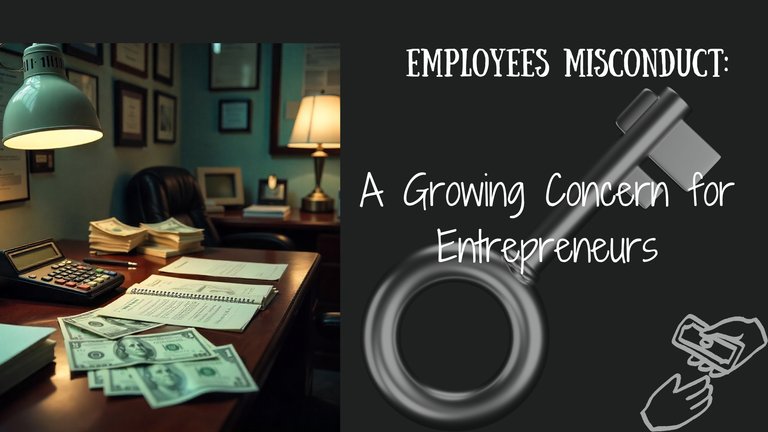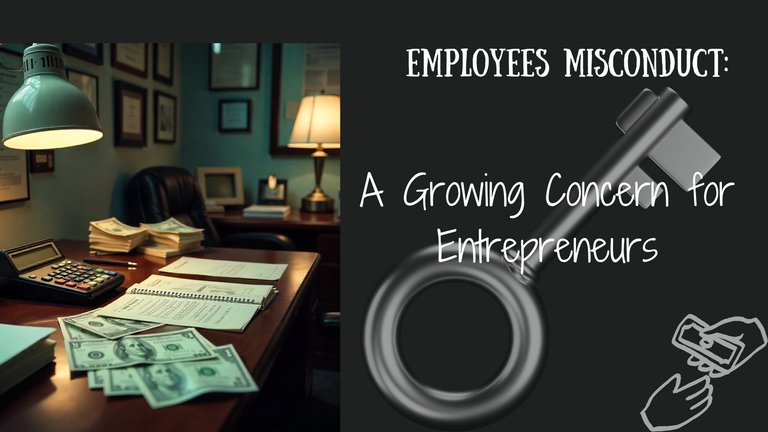Employees Misconduct & Theft: A Growing Concern for Entrepreneurs

As entrepreneurs, we’ve all been exposed in one way or another to the daily realities of running a business, whether it falls under goods or services. I’m sure many of us have had encounters with employees or co-workers while managing our own projects or assisting with someone else’s. And one issue we can’t ignore is employee misconduct, specifically that of theft. From creative ways to embezzle funds to subtle forms of sabotage, it’s a harsh reality many of us have faced.
I’ve heard from several business owners who’ve been burned by employees they trusted. And at some point, it’s no longer just about the money, but the betrayal, the broken trust, and how it eats into team morale.
So, like I mentioned earlier, I’ve come across a lot of real-life accounts about workers diverting funds meant for the business.
The first I heard last weekend was from a friend who sells thrift wears. He buys in bulk from a supplier who opens bales and sells to retailers like him. According to him, one of the supplier’s staff, a young lady who had worked there for a long time, recently approached him with a shady proposal. She offered to sell him 200 clothes, but instructed him to pay for 180 to the official business account and send the payment for the remaining 20 directly to her personal account. Her plan is that she would report to her boss that he only bought 180 pieces.
She tried to justify her actions by explaining she needed the money for house rent. When my friend told me about this, I encouraged him not to just reject her offer but to inform her boss, because if he didn’t, another customer might agree and enable her.
My friend eventually spoke to her employer, who was shocked. It turns out she was already accommodating this young lady, feeding her and paying her a normal salary. So rent wasn’t even an issue. Upon further investigation, they discovered the staff had already made similar deals with four other customers. On every market day (which happens once a week), she was stealing about $100, amounting to roughly $400 a month. Her boss was devastated. She cried and asked what she had done wrong to deserve such betrayal from someone she cared for like family.
Then just yesterday, another friend shared with me and incident that happened in his workplace. A co-worker of his had asked a client to pay into his personal account instead of the company’s. Afterward, he only transferred part of the money to the company and kept the rest for himself. Unfortunately for him, the client, unaware of his intentions sent the payment receipt to the Managing Director who had originally invited him to patronize the business. The director noticed the discrepancy and investigated the matter.

There are many other cases I’ve come across, each following its own twisted method.
And it made me wonder what happens to the entrepreneur who doesn’t have the time or knowledge to double-check every little detail? What about those who aren’t educated enough to take stock or balance accounts regularly? Who’s looking out for them?
I also can’t help but ask what drives employees to this point. Could it be low salaries? Toxic work environments? Or personal struggles? Whatever the reason, I still believe no explanation is enough to justify this kind of behaviour.
We all know that this misconduct can't be eliminated since we will always have greedy people amongst us. But then, I believe there are many actions we can take to reduce our chances of being a victim to such employees.
We can start by mentoring and monitoring our employees in both their working efficiency and character. Install surveillance cameras in appropriate areas. Implement an anonymous reporting system between employees and attach a rewarding incentive for those who report suspicious activity. Make it a habit to check balanced accounts and inventory periodically, even if not daily, doing it occasionally will keep everyone on their toes.
And very importantly, conduct proper background checks before hiring. This reveals not just their employment history, but also feedback from former workplaces and even the people in their community.
This theft might be in small change but at the end of the day it all amounts to something that could destroy a business. So it is very necessary that we are fully present in the management of our ventures or otherwise get someone with good integrity to oversee the management.
Those two employees were asked to refund all the stolen money and sacked from work, but there's a possibility that they'll repeat it in their new job.
It is sad to know that many entrepreneurs are experiencing this on a daily basis.
Ever had this kind of experience? How did you manage it? Please feel free to share your experience and tips in the comments below.
Thumbnail is made with canva. Image 1 is generated with AI.
![LEER EN ESPANOL]
!¡Hola Hivers y amigos de la comunidad Be Entrepreneur! Espero que os vaya bien. Últimamente, he notado una tendencia preocupante y me encantaría hablar de ella con todos vosotros.

He oído a varios empresarios que se han quemado por culpa de empleados en los que confiaban. Y en algún momento, ya no se trata sólo del dinero, sino de la traición, de la confianza rota y de cómo afecta a la moral del equipo.
Así que, como he mencionado antes, me he encontrado con muchos relatos reales sobre trabajadores que desvían fondos destinados a la empresa.
El primero que escuché el fin de semana pasado fue el de un amigo que vende ropa de segunda mano. Compra al por mayor a un proveedor que abre fardos y vende a minoristas como él. Según él, una empleada del proveedor, una joven que trabajaba allí desde hacía mucho tiempo, se le acercó hace poco con una propuesta sospechosa. Le ofreció venderle 200 prendas, pero le indicó que pagara 180 a la cuenta oficial de la empresa y enviara el pago de las 20 restantes directamente a su cuenta personal. Su plan consistía en informar a su jefe de que sólo había comprado 180 prendas.
Intentó justificar sus actos explicando que necesitaba el dinero para el alquiler de la casa. Cuando mi amigo me lo contó, le animé a que no se limitara a rechazar su oferta, sino que informara a su jefe, porque si no lo hacía, otro cliente podría acceder y permitírselo.
Al final, mi amigo habló con su jefa, que se quedó estupefacta. Resulta que ya estaba alojando a esta joven, dándole de comer y pagándole un sueldo normal. Así que el alquiler ni siquiera era un problema. Al investigar más a fondo, descubrieron que el personal ya había hecho tratos similares con otros cuatro clientes. Cada día de mercado (una vez a la semana), robaba unos 100 dólares, lo que suponía unos 400 dólares al mes. Su jefa estaba desolada. Lloró y le preguntó qué había hecho mal para merecer semejante traición de alguien a quien quería como de la familia.
Ayer mismo, otro amigo me contó un incidente ocurrido en su lugar de trabajo. Un compañero de trabajo había pedido a un cliente que pagara en su cuenta personal en lugar de en la de la empresa. Después, sólo transfirió una parte del dinero a la empresa y se quedó con el resto. Desgraciadamente para él, el cliente, ignorante de sus intenciones, envió el recibo de pago al director gerente que le había invitado inicialmente a frecuentar la empresa. El director se dio cuenta de la discrepancia e investigó el asunto.

Me he encontrado con muchos otros casos, cada uno siguiendo su propio y retorcido método.
Y eso me hizo preguntarme qué ocurre con el empresario que no tiene el tiempo o los conocimientos necesarios para comprobar cada pequeño detalle. ¿Qué pasa con los que no tienen la educación suficiente para hacer balance o cuadrar las cuentas con regularidad? ¿Quién vela por ellos?
Tampoco puedo evitar preguntarme qué lleva a los empleados a este punto. ¿Podrían ser los bajos salarios? ¿Entornos de trabajo tóxicos? ¿O problemas personales? Sea cual sea la razón, sigo creyendo que ninguna explicación basta para justificar este tipo de comportamiento.
Todos sabemos que esta mala conducta no puede eliminarse, ya que siempre habrá personas codiciosas entre nosotros. Pero creo que hay muchas medidas que podemos tomar para reducir las posibilidades de ser víctimas de este tipo de empleados.
Podemos empezar por tutelar y vigilar a nuestros empleados tanto en su eficacia laboral como en su carácter. Instalar cámaras de vigilancia en las zonas adecuadas. Implantar un sistema de denuncia anónima entre empleados y ofrecer un incentivo gratificante a quienes denuncien actividades sospechosas. Acostúmbrese a revisar periódicamente las cuentas equilibradas y el inventario, aunque no sea a diario, hacerlo de vez en cuando mantendrá a todos alerta.
Y, lo que es muy importante, compruebe debidamente los antecedentes antes de contratar. Esto revela no sólo su historial laboral, sino también las opiniones de anteriores lugares de trabajo e incluso de la gente de su comunidad.
Este robo puede ser en calderilla, pero a fin de cuentas todo equivale a algo que podría destruir una empresa. Así que es muy necesario que estemos totalmente presentes en la gestión de nuestras empresas o, de lo contrario, conseguir que alguien con buena integridad supervise la gestión.
A esos dos empleados se les pidió que devolvieran todo el dinero robado y se les despidió del trabajo, pero existe la posibilidad de que repitan en su nuevo empleo.
Es triste saber que muchos empresarios sufren esto a diario.
¿Has tenido alguna vez este tipo de experiencia? ¿Cómo lo gestionaste? No dudes en compartir tu experiencia y consejos en los comentarios de abajo.
La miniatura se hecho con canva.
Imagen 2 se genera con AI.
Let me start with greed but also, how is such employee treated and paid?
Some employers barely value their employees, not to talk of paying them Well and this is part of what triggers their employees to engage in an illegal form to gain money.
Then going back to greed, some employees are naturally greedy and such people can bring down your business to scratch.
Yeah, I think employers can also contribute to this kind of negative behavior. People often act out of character when they're frustrated.
But still, stealing is never the right choice. It's far better to leave the job with your integrity intact than to compromise your values.
Gracias por traer este tema tan importante a la conversación. Qué duro es cuando la traición viene de alguien en quien confiaste, no solo en lo profesional, sino también en lo humano. He visto situaciones parecidas y coincido contigo: más allá del dinero, lo que más duele es el quiebre de la confianza.
Creo que, como emprendedores, necesitamos aprender a equilibrar la confianza con la supervisión. No se trata de desconfiar de todos, pero sí de tener estructuras claras que protejan nuestro esfuerzo y el de quienes sí actúan con integridad.
Y también me quedo pensando en lo que mencionas: ¿qué lleva a una persona a actuar así? Sin justificar, es valioso mirar el contexto, porque muchas veces hay necesidades no dichas o frustraciones acumuladas detrás de esas decisiones equivocadas.
Gracias por compartir estos ejemplos tan claros. Sin duda nos invitan a estar más atentos, pero también a fortalecer nuestras empresas desde la cultura interna.
Thank you for bringing this important topic to the conversation. How hard it is when betrayal comes from someone you trusted, not only professionally, but also humanly. I have seen similar situations and I agree with you: beyond the money, what hurts the most is the break of trust.
I think that, as entrepreneurs, we need to learn to balance trust with supervision. It is not a matter of distrusting everyone, but of having clear structures to protect our efforts and those who do act with integrity.
And I am also left thinking about what you mention: what drives a person to act this way? Without justification, it is valuable to look at the context, because many times there are unsaid needs or accumulated frustrations behind those wrong decisions.
Thank you for sharing these clear examples. They certainly invite us to be more attentive, but also to strengthen our companies from the internal culture.
Thank you for your lovely comment. This is something that is happening in many establishments.
Most small businesses do not grow because the employees are earning more than they should, inappropriately.
Like you said we have to balance trust with supervision so we don't experience something like this.
!LADY
Misconduct can be be dangerous must especially when it have to do with our business, that is the reason that approach matter a lor in what ever we are doing.
Definitely 💯
We have to be present somehow.
Thank you for your witness vote!
Have a !BEER on me!
To Opt-Out of my witness beer program just comment STOP below
View or trade
BEER.Hey @phyna, here is a little bit of
BEERfrom @isnochys for you. Enjoy it!Learn how to earn FREE BEER each day by staking your
BEER.View or trade
BEER.Hey @phyna, here is a little bit of
BEERfrom @isnochys for you. Enjoy it!If you like BEER and want to support us please consider voting @louis.witness on HIVE and on HIVE Engine.